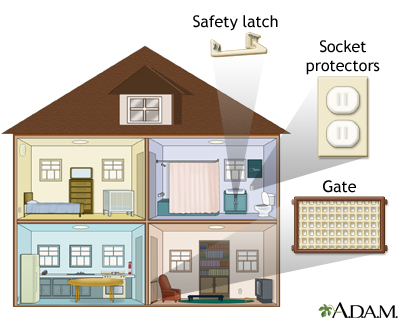
It is important to keep your home safe. There are many options. You can do this by installing smoke detectors and keeping children safe from sharp objects. These tips will make your home safer and keep you and your family safe. There are many online resources that can help you protect your home.
How to identify hazards in the home
To protect your family and home, it is vital to identify any potential hazards. Toxic plants and electrical outlets are two common home hazards that can cause accidents and illness. It is important to avoid them or call the local poison control center to learn what you can do to protect yourself and your family. Children can be particularly vulnerable to electrical outlets. Children may touch electrical outlets with wet fingers or stick objects into them. You can prevent this by installing sockets and outlets for children. Protective plastic covers can be used to cover electrical outlets to prevent accidental shocks.
Your home may be a danger zone for falling, breaking and moving objects. Your home could also be a fire hazard. Every year, conduct a safety check to identify potential hazards and remove them.
Installing smoke detectors
Fire safety starts with home safety. Detectors should be located in an area with little draft, around 12 inches above the ceiling, and should produce a loud alarm when activated. You will need an electrician to wire the alarm system.

There are two main types, hard-wired and batteries-operated, of smoke detectors. Hard-wired alarms need electrical connections in a junction box. An electrician should be consulted if you aren’t familiar with electrical wiring.
Keep children away
Keeping children away from sharp objects in your home is an important safety measure for all parents. Sharp objects can inflict serious injuries like cuts and splinters. In order to prevent these injuries, you should keep knives and forks out of reach of children. You can also use childproofing materials and lock cabinets.
The kitchen and bathroom are also dangerous areas, and you should keep children away from these areas. Also ensure that mirrors are securely attached to walls and that sharp objects are safe from reach. You should also cover electrical outlets with safety caps. Additionally, razor blades should be kept out of reach for children. Make sure you lock all cleaning products and tools as well any dangerous tablecloths.
Preventing electroshocks
Electric shocks can be dangerous and unsettling. It is therefore important to learn how to avoid them at home. Electrical shocks can occur from faulty appliances or damaged wiring. Water is also a good conductor of electricity, so it should be kept away from appliances and work areas. Ground Fault Circuit Interrupters, or GFCIs, should be installed near outlets. These interrupters detect when someone touches them and immediately cut off power.
A high voltage electrical shock can cause a person to experience intense pain in the limb, or even cause the victim's heart to stop beating. In the most severe cases, the victim may need medical care. The victim will only need to take pain medication and change his dressing if the accident is not serious. The amount of damage that electrical shocks can cause depends on the voltage and source as well as the person's overall health.

Preventing poisoning
Poisoning, a major health problem, is 90% of all poisonings that occur at home. The kitchen, bathroom, bedroom and living room are the most frequent places for poisoning. Luckily, there are some simple steps you can take to prevent poisoning in your home. Keep all dangerous and prescription medications out of reach from children. It is important to keep medications in the original container.
It is vital to understand the instructions on medications and read product labels. Keep medications in locked cabinets, especially for younger children. Children between the ages of one and three years are at highest risk for accidental poisoning.
FAQ
How do I learn self defense at home?
There are many ways you can improve your self defense skills. Martial arts is the best place to begin. Martial arts are great as they teach you how defend yourself without the use of weapons. They also help build confidence and fitness. Many schools also offer online classes. You don't even have to attend a class. It is important to choose the type of martial art that you are interested in learning. Do you want to learn Kung Fu? Or perhaps Karate? While these styles are quite different, both are excellent options. They differ mainly in the way they fight. Kung fu, by contrast, focuses on grappling or kicking while karate focuses only on striking techniques.
A school should consider offering instruction in multiple forms. This is the number of martial arts styles that are taught in a school. Some schools teach only one type of martial art, such as Tai Chi. Others may offer instruction for several types of martial arts. You should ensure you select a school that is reputable, no matter what you choose to learn. Ask around to see who has been there, and ask about their training history and the background of the instructors. Talk to someone who teaches at the school if you can.
Do stun guns hurt people?
It's not true. The stun gun injects a tiny amount of current into the skin.
This isn't permanent damage.
What are some quick self-defense moves you can do?
Self-defense methods include punches. You might also consider grappling like judo or jujitsu and karate, as well as taekwondo.
For protection against an attacker who would like to harm you, self-defense techniques are available.
They can also help someone defend themselves from an attack.
There are many ways you can practice self-defense. Pick the one that works best for you.
What is the cost of a self-defense class?
There are many self-defense classes available. The price of self-defense classes varies depending on where they are held and whether they are taken in person or electronically.
Some schools charge just $50 per Month, while others charge upto $200.
Look into local community centers for a cheaper option. These centers often offer self-defense lessons for free.
Which is the best weapon for self-defense and defense?
A sharp knife is your best defense weapon. A knife is the best weapon for self-defense.
You don't need to spend $100 on a folding knife to protect your self. The job can be done with a simple pocketknife. For any emergency, you can add some extra tools.
Statistics
- Most likely, the person will want some kind of boxing match, so if you can out-box them, this would be 100% ideal for survival. (budodragon.com)
- Verbal harassment was the most common form, but 51 percent of women said they were touched or groped in an unwelcome way, while 27 percent of women survived sexual assault. (healthline.com)
- Some people walk into a gym thinking they are going to become the best by training whenever they like and not putting 100% effort in. (budodragon.com)
- The Rape, Abuse & Incest National Network reports that 70 percent of sexual violence cases aren't committed by random strangers in a dark alley but by people we know: friends, family, partners, co-workers, etc. (healthline.com)
External Links
How To
How To Survive A Home Invasion
Home invasion is frightening, especially if you have children. We didn't know we would have to go through this ourselves when we started our home security system installation journey. Here are the lessons we have learned thus far.
-
You must not allow your kids to see the attackers. Two men broke into our home upstairs while our kids were sleeping. We kept them downstairs until the police arrived. The police arrived and our kids were not hurt. However, the traumatizing images did enough to make them feel scared.
-
Lock All Valuables. In our bedroom, we keep valuables safe. Even if someone breaks into the house, they won't be able to access it.
-
Keep An Eye Out For Burglars. Our neighborhood has many burglaries. We always keep an eye out for suspicious vehicles and people.
-
Have A Backup Plan. Our family will be financially protected in case anything happens. We have also made a plan to leave this country, if needed.
-
Always be prepared Prepare for anything. Be prepared with food, water, as well as other supplies.
-
Call 911 First. If you find out that someone has broken into your home, call 911 immediately. It's better to call the authorities than to wait for them to break down your door.
-
Use common sense. Never allow anyone into your home who doesn't belong. Do not invite strangers.
-
Seek out help from neighbors and other people in the local area. Call neighbors or friends if you feel unsafe. They will be able to watch your back and call the police.
-
Be calm and follow the instructions of police officers. Keep calm and do as the officers direct. Do not run or resist arrest.
-
Photograph All Evidence. Any evidence discovered during the investigation should be taken pictures. You can take pictures of fingerprints, blood samples, or other evidence.
-
Local Law Enforcement Should Be contacted. Even if you are not the victim, it is a good idea to file a report with local law enforcement. It may help you avoid future criminal acts.
-
Contact the Insurance Company Immediately. Call your insurance company immediately. You can tell them all about what happened and they will send an adjuster out to assess the damage.
-
Take away personal belongings. Be sure to get rid of personal belongings before you leave. Don't wear expensive jewelry. Take it off and put it away.
-
Clean Up After Yourself. Take care of yourself. Clear away trash and broken glass. Make sure that all doors and windows are securely locked.
-
Don't Talk About What Happened. Don't talk about anyone's past. It is possible that someone might use the information against you.